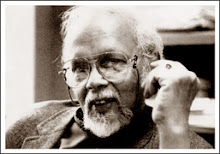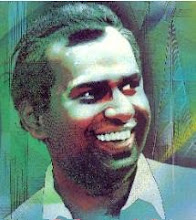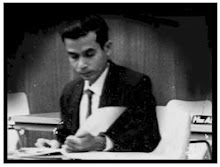Source: Sunday Observer
Date : 1 November 2009
|
|
He is recognised as the father of modern street theatre in Sri Lanka. His students have moved from the street to the stage, from stage to television and some even to the silver screen. They owe much to Gamini Haththotuwegama, who, even after many decades of political theatre, does not seem to have moved at all. In his mid sixties now, the man remains in the street, metaphorically and literally.
He was maybe a couple of years senior to my parents at the Peradeniya University, and they called him “GK”. Some refer to him as “Hatha”, some as “Gamini” and others like myself, “Haththa”. My first recollection of this effervescent man goes back to at least thirty years. I had heard my grandmother complaining that “GK hadn’t returned some books he had borrowed”. They belonged to my late grandfather, who died before I was born.
So, a couple of years later, when he happened to visit us, I asked him, quite rudely actually, “where are seeya’s books?” He laughed quite heartily.
I can’t remember if I thought it was funny, even though I have known people to laugh with Haththa, not so much for the content of his jokes but his laugh itself.
It would have been about fifteen years later that I really got to know him.
I was in my second year at Peradeniya. This was just before the bheeshanaya was forced down our throats, although the signs of the impending tragedy were there for everyone to see. My friends, a group of around 25 people, had been “banned” from engaging in politics. It was quite fortuitous then that Haththa happened to be around, as a visiting lecturer in the English Department. He organised a street theatre workshop, which most of us joined not really realising at the point that it had great potential as a medium for political commentary. We ought to have known, however, because by the time Haththa would have logged almost twenty years of uninterrupted experimentation with the genre with great success.
The workshop snowballed into a production, “Sarasavi Kurutu Gee” (Campus Graffiti) which we played at the Sarachchandra Open Air Theatre, better known as the “wala”. If anything captured all the elements, the subtle nuances, the tragedies, the humour and hopes of what being a “student” at that time involved, it was this very deliberately rough collage of incidents, songs, skits put together by a group of around 30 students.
Haththa crafted this production with a series of exercises, seemingly unrelated but all touching on issues pertaining to the university student in a time of political turmoil. We all chipped in with ideas. We took popular songs and parodied them to suit the general temper of the “play”. We made fun of our teachers, the university administration, the government and of course ourselves.
Perhaps what was most educational in the entire process was that we realised that everyone could be an actor. Well, to be more honest, that we all act, all wear masks and therefore “acting” is not something that has to be learnt, but a human trait that is in all of us waiting to be recognised and exploited. Hopefully for beneficial purposes. I am sure that if not for Haththa, Chandraratne Bandara, Priyantha Wickramasinghe and Upul Kaluhetti, among others, would never have dreamed that they had the potential to become excellent actors. We wouldn’t have known either.
Haththa, to my knowledge, had a problem getting a master’s degree. His argument was that there was no one competent to supervise his thesis. That may have been true, but I believe the real reason was that he found it boring to write about what he did - theatre. Being a non-conformist in many ways, Haththa might have found the task of satisfying some departmental requirement too much to take. He had to pay for this intransigence, of course. For too long, he has had to depend on the good heart of department heads for visiting lecturer appointments.
He is a character. A legend, in fact. He had a carefully developed reputation as a man who paid scant attention to physical hygiene, although I am sure he would deny this. During those turbulent years, Haththa often stayed at Marcus Fernando Hall, as the guest of the then Subwarden, Navaratne Bandara. Navaratne once told me, “can’t you tell your sir to at least wash his clothes?” He was smiling when he said this. I am sure it was said in jest. But Haththa’s “haduness” was legendary. I distinctly remember him making quite a cogent argument for non-bathing. He said, “It’s not good to take a bath on the morning of the play, because it could have an impact on your voice. Actually a bath on the previous night might not be a good idea either. Come to think of it, bathing definitely involves the risk of ruining your voice, and the smallest impact might ruin the production.” His guffaws as he meditated thus, were reminiscent of his laugh when he adroitly brushed aside my complaint about the non-returning of borrowed books. In the year 1990, he had to cancel a performance of the Sinhala version of Hamlet at the Sri Jayewardenepura University because he lost his voice. Maybe he had taken a shower, I don’t know.
And yet, unlike most “legends”, Haththa remains one of the most easy going, easily accessed personalities around. I remember him as a man so generous with his time and his knowledge, that he would forget that although theatre was life to him, it was not exactly seen in those dimensions by all his students. His rehearsals would take up entire days. They were at times preceded by a couple of hours by Haththa’s yarns and he had hundreds to relate. Some he would repeat, forgetting that we had heard it all before.
All part of the personality, I believe. Easily forgiven, for he was not only respected but loved too. “Haththa pehedilivama kollek” (Haththa is most definitely a boy). He was and still is I believe, ageless. A wise old man, a teacher, a young man at times as fervent about “revolution” as an undergraduate, and a baby too.
I remember him as an adoring father. His two children, Rajiv and Chamindu, who were fully fledged members of the drama group at Peradeniya even though they were in their early teens, were loved by all of us. Haththa loved singing the immortal theme song, if one may call it, of Sinhabahu. He would launch into “gal lena bindala” at the slightest provocation. I have seen many versions of Sinhabahu over the years, but have never encountered such a powerful and passionate rendering of this song. It has to do with his children and particular circumstances which I do not intend to go into here.
Haththa knows, I am sure. So do we all.
I do know that there are people who see Haththa as just a “street theatre” person. He is much more than that. His knowledge of theatre goes beyond being familiar with one of its many forms. He is an expert on world theatre and someone who can creative fuse the many forms and themes that he encounters. There are others who would be more competent to write about these things. For me, Haththa is an effervescent character, a one of a kind, full of idiosyncrasies, full of vigour, full of hope for the future. I was never fully convinced of the logic of political positions he advocated. I do know however that he has not willingly harmed or wished harm on anyone.
“One day I fell asleep in a Horana bound bus. I got up somewhere close to Horana yelling, ‘budu thaaththe maava beraganna’ (Father, save me). The bus was almost empty and most of the people knew me. If I had been a ten year old, it wouldn’t have been strange. But here I was, a fifty plus man, yelling out to my father!” We all burst into laughter when he related this story.
A man who can laugh at himself is half way towards enlightenment, I believe.
I shall not comment on the other half. I don’t need to, for we live in a world where 99% of those who profess a love for humanity are just play-acting. In Haththa’s case, theatre is a heart that he embraces and acting is the way he pumps this heart so that its message of love and love for the collective effort is sent along all the arteries that feed hope in hungry people.
We need more of his tribe both on the street and out of it, if only because of all the histories, violence, oppression and resistance that are embedded and in fact make up what is so casually and un-politically referred to as “the street”. This street, we must not forget, is not found only in the teeming metropolis. It is in every village, every factory, every school, police station, army camp and even the jail. He has my salute, this man who has never been dazzled by the glitter of the lush avenues. He has my salute, for what it is worth.
Dr. Gamini Haththotuwegama, widely recognized as the father of street theatre in Sri Lanka, and versatile and indeed omnipresent personality in the arts, passed away in the early hours of Friday, October 30, after a long battle with cancer. He was 73 years old. Dr. Haththotuwegama taught both in the formal academic institutions (University of Peradeniya and Kelaniya University) as well in informal settings through innumerable drama workshops. The beneficiaries of his teaching largesse have gone on to become experts and stars in their own right, on stage and on screen. He is survived by his son Rajith and daughter Chamindu. His mortal remains will be moved to the Kala Bhavana for the public to pay their last respect from 10.00 am onwards on November 1. The funeral will take place at 4.30 pm the same day at the General Cemetery, Borella.
Courtesy:http://www.srilankaguardian.org/2008/04/haththa-painting-drama-of-street.html
(This was written in April 2008 by Malinda Seneviratne)





































No comments:
Post a Comment